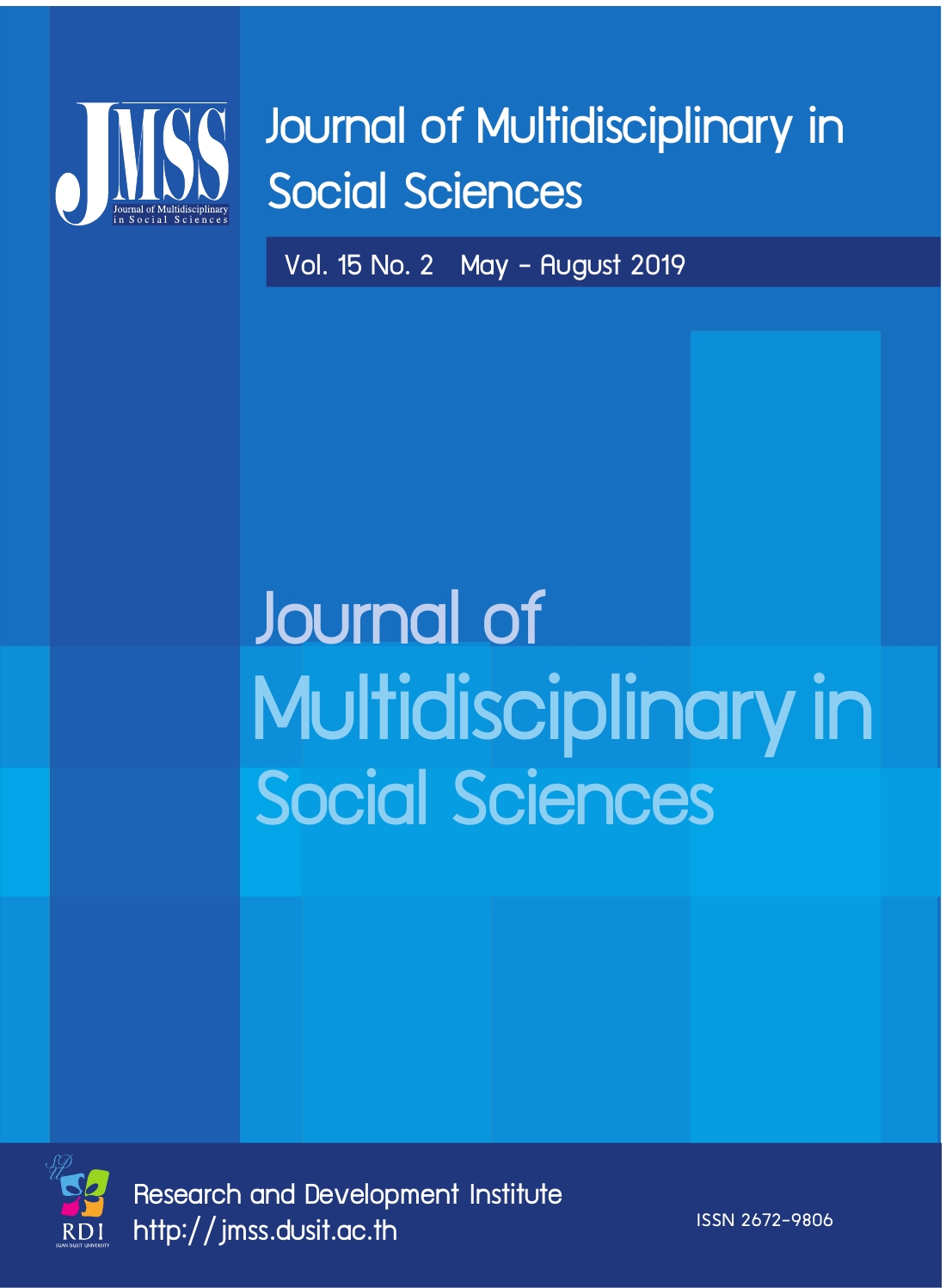Factors Influencing and Evaluation Criteria Social Responsibility Management in Secondary School
Keywords:
Factors Influencing, Evaluation Criteria, Social Responsibility Management, Secondary SchoolAbstract
The objectives of this study were: 1) to examine social responsibility management in secondary schools, 2) to identify internal factors influencing social responsibility management in secondary schools, 3) to identify external factors influencing social responsibility management in secondary schools, and 4) to develop the evaluation criteria on social responsibility management in secondary schools.
The methodology used in this study was mixed method research including quantitative approach and qualitative approach. For the quantitative approach, there were two sample groups including 329 teachers and 391 students; both selected from the Secondary Educational Service Area Office (Nonthaburi). The multi-stage random sampling method and the stratified random sampling method were applied for the teacher group and the student group, respectively. The instruments used in the study was questionnaire in Likert scale with 5 ranks conducted by the researcher. The statistics used for data analysis were mean, standard deviation, and multiple regression analysis. For the qualitative approach, a focus group method was used to develop the evaluation criteria on social responsibility management in secondary schools and appropriateness of application was tested by the evaluators of school.
The research results were as follows: (1) The social responsibility management in secondary schools was highly found in all aspects. (2) The internal and external factors influencing social responsibility management in secondary schools were statistically significant at level .05. (3) Corporate governance, public responsibility, respect for stakeholder interest, developing of community, social and the environment and being a good citizen in society were the components thatmust be evaluated with 27 indicators. The rubric score for each indicator was 0-5.
References
Bowen, H. R. (1953). Social Responsibilities of the Businessman. New York: Harper & Row. Chalangsut, P. (2015). Development of environmental and community involvement and development indicators according to corporate social responsibility standard in Thai industrial sector (Doctor’s dissertation). Bangkok: National Institute of Development Administration.
Chowathanakun, K. (2014). Work behavior under the concept of corporate social responsibility of instructors in higher education institutions. FEU Academic Review, 8(2), 30-40.
Clarkson, M. E. (1995). A Stakeholder Framework for Analyzing and Evaluating Corporate Social Performance. Academy of Management Review, 20(1), 92-117.
Kanchanapan, S. (2008). Corporate social responsibility management strategy of business corporation (Master’s thesis). Bangkok: Chulalongkorn University.
Kanjanawasee, S. (2011). Theory of evaluation. Bangkok: Chulalongkorn University Press. Koestoer, Y. T. (2007). Corporate Social Responsibility in Indonesia Building internal corporate values to address challenges in CSR Implementation.
Jakarta, Indonesia. Koolkrong, U. (2010). Transformational leadership and corporate social responsibility of school administrators (Master’s thesis). Bangkok: Silpakorn University.
Harvey, L. (2004). Analytic Quality Glossary, Quality Research International. Retrieved January 29, 2016, from http://www.qualityresearchinternational.com/glossary
Johnstone, J. N. (1981). Indicators of education systems. London: UNESCO.
Ministry of Education. (2008). The basic education core curriculum B.E. 2551. Bangkok: The Agricultural Cooperative Federation of Thailand.
Navakul, S. (2010). Corporate governance and competitiveness of Thai listed companies in the Stock Exchange of Thailand (Doctor’s dissertation). Bangkok: National Institute of Development Administration.
Office of the Education Council. (2015). Research report on the management of civic education development for citizenship. Bangkok: Bureau of Educational Standards and Development, Office of the Education Council
Office of the Higher Education Commission. (2014). A manual for internal quality assurance in higher education B.E. 2557. Public hearing edition. Bangkok: Office of the Higher Education Commission.
Phonphotthanamat, W. (2014). Good governance in public organizations: Case studies of schools under the Office of the Basic Education Commission, Ministry of Education (Doctor’s dissertation). Bangkok: Chulalongkorn University.
Prommapun, B. (2013). Seminar on educational assessment. Bangkok: Sukhothai Thammathirat Open University.
Sanum, S. (2005). Teachers and students’ opinion on academic management of Rajaprajanugroh 33 School, Lopburi Province (Master’s thesis). Lopburi: Thepsatri Rajabhat University.
Songsiri, W. (2015). Factor affecting of corporate social responsibility (CSR): A case study of IRPC Public Company Limited (Master’s thesis). Bangkok: National Institute of Development Administration.
Sornsuwan, R. (2014). The integration of social responsibility in secondary school under the Office of the Basic Education Commission, Ministry of Educaiton (Doctor’s Dissertation). Bangkok: Silpakorn University.
Taro Yamane. (1967). Statistics, An Introductory Analysis. New York: Harper and Row.
Wood, D. J. (1991). Corporate social performance revisited. Journal of Academy of Management Review, 16(4), 691-718.
Downloads
Published
How to Cite
Issue
Section
License

This work is licensed under a Creative Commons Attribution-NonCommercial-NoDerivatives 4.0 International License.








